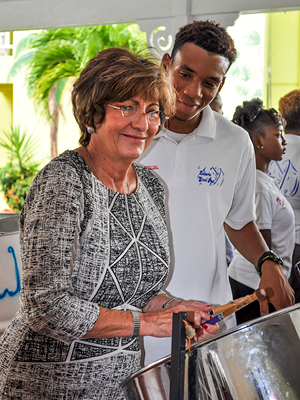Launch of USAID’s violence-prevention project uses evidence-based techniques to support youth in the Eastern and Southern Caribbean
By Jillian SlutzkerDecember 23, 2016
“Either we invest in our youth or we face greater numbers of youth remaining unemployed and trapped in a cycle of poverty, crime and underdevelopment.”
GROS ISLET, ST. LUCIA – The United States Agency for International Development /Eastern and Southern Caribbean (USAID/ESC) launched a new project to reduce the risk factors that drive youth crime, violence, and victimization in St. Kitts and Nevis, St. Lucia and Guyana.
The program, the Youth Empowerment Services Project (YES), seeks to increase protective factors that build resiliency and the capacity of regional bodies, national governments and community stakeholders to identify and analyze risk factors experienced by crime-affected communities, at-risk youth and youth in conflict with the law and protective factors that build resiliency.
The USAID-funded $64 million project will also strengthen protective factors that support youth, family and community resilience.
Speaking at the Nov. 15 launch in St. Kitts and Nevis, Christopher Cushing, USAID/ESC’s Mission Director, emphasized the key role local organizations and families will play in the implementation and success of the project.
“YES will emphasize community involvement at all levels,” he said, noting the project’s “integrated and collaborative approach” to addressing youth crime and violence.
Speaking at the Nov. 17 launch in St. Lucia, Didacus Jules, Director General of the Organisation of Eastern Caribbean States, welcomed YES to the region.
“From almost every perspective, youth are the demographic at the greatest risk in the region,” explained Jules.

Engaging youth in preventative programming that reduces their risk for crime and violence is critical in a region witnessing rising levels of youth crime and unemployment, and where youth comprise an estimated 30 percent of the population.
The U.S. Ambassador to Barbados, the Eastern Caribbean and the OECS, Linda Taglialatela, told attendees at the Nov. 17 event that the investment in evidence-based preventative measures to reduce youth risk and support them to chart alternative, positive futures is an investment in a stronger, more prosperous region.
“Either we invest in our youth or we face greater numbers of youth remaining unemployed and trapped in a cycle of poverty, crime and underdevelopment,” she said.
The YES project is broken into three components: Community, Family and Youth Resilience implemented by Creative Associates International; Strengthened Evidence-Based Decision-Making by the United Nations Development Programme; and the Juvenile Justice Reform Project II by the Organisation of Eastern Caribbean States.
A public health approach for all risk levels
Using a public health-oriented, evidence-based approach, the Community, Family and Youth Resilience component, implemented by Creative, targets youth interventions across three distinct risk levels determined by an empirical risk assessment known as the Youth Service Eligibility Tool. These groups include the general population of youth in at-risk area, youth empirically at the highest risk for violence, and youth offenders.
Programming at the individual, family and community level will support at-risk youth to lower their risk factors for crime and violence and strengthen protective factors that support healthy and positive behaviors.
Creative draws on a proven citizen security policy framework used successfully in programs in Central America, including the USAID-funded Alianza Joven Honduras (Youth Alliance Honduras) violence prevention project and Proponte Más, a secondary violence prevention program that applies family counseling to help reduce risk factors for youth most vulnerable to joining gangs.
In partnership with young people and their support networks at the family and community level, the project component is expected to reach some of the most vulnerable youth and stem youth violence.
“The Community, Family and Youth Resilience program is the cornerstone of this project in which we expect to tackle head on the risk factors that are fueling youth involvement in crime,” said Ryssa Brathwaite, USAID Youth Program Management Specialist, at the Nov. 17 event.
Under USAID/ESC’s Evidence-based Decision-Making component, implemented by the UNDP, findings from these interventions will support policymaking and programming at the national and regional level to ensure the most effective approaches reach targeted populations.
“Reliable data allows us a better understanding of the situation and a better ability to implement the right programs,” said UNDP Resident Representative, Stephen O’Malley, speaking at the Nov. 15 launch event in St. Kitts and Nevis.

The YES project will build the capacity of local youth-serving organizations and governments to utilize these tools and approaches.
Governments committed to serving and empowering at-risk youth
The national governments that comprise the Organisation of Eastern Caribbean States are committed to playing a critical role in the success and sustainability of YES, which aligns with regional and national youth policies.
Speaking at the Nov. 15 St. Kitts and Nevis launch, Marcellus Albertin, Head of the Human and Social Development Cluster at the Organisation of Eastern Caribbean States, said that challenges youth face—such as crime, school dropout, teen pregnancy and unemployment—are not their fault. It is incumbent upon the region’s governments to support them to overcome those challenges, he said.
Lenard Montoute, St. Lucia’s Minister of Equity, Social Justice and Empowerment, referred to the nation’s past approach to youth crime and violence as a “get tough approach” that focused heavily on criminalization rather than prevention or reintegration and failed to deliver results. This must change, he said.
“We can ill afford to discard sections of our population to the margins and confine them to a life cycle of dependency, stigmatization and negativity,” Montoute said. “Our new approach demands a multidimensional approach and outlook where all stakeholders, especially our youth, are included in the process of identifying and solving the challenges.”

